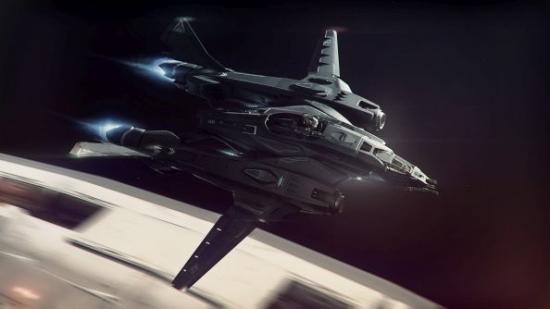When a game takes as long in development as Star Citizen, it’s only natural those on the outside would look to compare it to other, arguably similar titles that have managed to reach the market in far less time. For those eagerly awaiting Cloud Imperium’s epic space sim, the game that has them green with envy is Elite: Dangerous.
Fancy getting off planet Earth? Check out the best space games on PC here.
Kotaku’s in-depth look at Star Citizen’s continued development – which we’ve already touched on here – makes reference of the fact a portion of fans have lost patience with Cloud Imperium in recent years, with many citing Elite: Dangerous as an example of the way development should have been handled.
Released in late 2014, David Braben crowd funded its development but kept stretch goals and the budget behind the game largely frozen. In short, Frontier Developments held expectations firmly in check and resisted adding extra features during the game’s development.
It may not have the scale or ambition of Star Citizen, but it did manage to make it to market in a comparatively short amount of time.
For the man behind Star Citizen, however, Elite Dangerous is an entirely different kettle of fish. While Chris Roberts told Kotaku Braben’s approach was “a totally viable way to go about it”, he also claims the game itself launched with the “basic, bare minimum of features” and dismisses the idea that it’ll be easier for Frontier to retrofit the game later on in life if Star Citizen proves to be a threat.
“You’re just trading and earning some money and upgrading your ship,” Roberts is quoted as saying, branding Elite: Dangerous as “the same game you had 20 years ago”.
He continues, “It’s better to have your engineering considerations taken care of now, rather than trying to retrofit as you go along. It definitely is a harder approach to take, but I think long-term it will build a better foundation.”
Roberts’ ambition is for Star Citizen to be compared to the likes of World of Warcraft and EVE Online in terms of scale, noting that “if it works it’s hopefully going to stay alive for a long time, like 10-plus years.”
In contrast, Kotaku’s piece makes reference to Star Citizen developers both past and present, with some giving the impression Roberts was difficult, arguably even impossible to work with given his apparent habit of wanting to add scores of new features he’d seen in other games.
The suggestion is, development of the repeatedly delayed Star Citizen is running away with itself because Roberts can’t tether his ambitions.
For Roberts, it appears apologising for broadening the game’s scope is not an option. “It needs to have a solid foundation that’s scaleable and can be constantly maintained and built upon easily,” he says. “If we don’t do a lot of this stuff upfront then we’re going to repay that technical debt later on.”
While he notes overcoming the technical challenges that are part and parcel of Star Citizen’s seemingly expanding feature set are an issue – they’ve “caused a lot of the frustrations on the design and the art side, because they’ve been blocked on getting past this technical debt” – he holds the belief that it will all be worth it.
“The race isn’t finished yet,” he concludes. “Wait till the finish line is crossed and then I’ll say people can make judgements about whether it was the right way or not. Instinctively, it was the way that felt right to me.”
You can check out the rest of Kotaku’s piece here.
